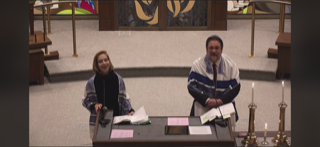
ENGLEWOOD, N.J.—In a time when people desperately need a sense of community amid fear and anxiety, online services at area houses of worship are helping people stay connected to a message of hope.
Although Bergen County houses of worship have been closed due to the Coronavirus, many are now conducting online services. In many instances, this format has created an even stronger bond between clergy and their congregants.
Rev. Richard Hong, pastor of the First Presbyterian Church of Englewood (FPCE), said, “I learned the value of online community nearly 25 years ago. I was involved in an online community of technical people on CompuServe, one of the earliest online services. I exchanged messages with people every day. One day I awoke to a message that one of our members had been caught in a robbery and was shot and killed. I cried. I cried even though I had never met him in person. That taught me that you can feel relationships deeply, even if you never met in real life.”
FPCE is now offering worship services online on Sunday mornings (9 a.m. for the contemporary service and 11 a.m. for the traditional service) for at least the next two weeks. In addition to Reverend Hong’s sermon, viewers can also experience a children’s message and prayer time. People are able to send personal prayer requests by text message, thus allowing the service to acknowledge the personal needs of people watching.
Both services also use music previously recorded by the band and choir.
FPCE services, in abbreviated 35 to 40 minute format, are available at fpce.live and on the church’s Facebook page, and people do not need to be online at that time. After the services end, replays are available on demand.
“For the last three years we have had the option of watching worship online,” Hong explained. “This is a great way for people to get to know us before deciding to attend, and when people cannot attend, they can stay connected to us. Everyone from people who are ill, shut-ins, or brand-new moms watches us online. In a typical week, the number of people who watch us online is about 30% of the number of people who attend in person. On March 8, as the outbreak was deepening, that rose to 150% when many of our regular attendees chose to stay home.”
On March 15, several hundred people tuned in to hear Hong’s service online via the church’s Facebook site. Aleta Frezzell, who usually visits the church on Sunday, was very pleased with this e-worship service, and many people hardily agreed.
“It was great!” Frezzell said. “During the service I texted in a special prayer for the people who had Coronavirus, and Rev. Hong read it online.”
Hong was delighted with the overall response.
“According to our morning metrics, our live attendance averages 208 people. This virtual format received 109 views in the 9 am service. There were 233 views in the 11 a.m. service, with an average watch time of 18 minutes. Since more than one person may have been on each computer screen, this is terrific!”
Hong believes that the church of the future will involve both online and in-person components.
How Temple Sinai of Bergen County is working online
Synagogues throughout Bergen County are also going virtual with excellent results. Last week, a message was sent to the all members (in over 1,500 households) of Temple Sinai of Bergen County in Tenafly. The notice, written by Rabbi Jordan Millstein, Anne-Marie Bennoun, the temple’s president and Joe Slade, Executive Director, was informative and uplifting:
We pray this note finds you, your family and friends physically healthy and managing to cope emotionally as our nation faces this unprecedented crisis due to the spread of the coronavirus. The Talmud teaches, “Kol Yisrael arevin ze ba’zeh v’kulan k’guf echad” – “All Israel is responsible for one another and are like a single body.” Like the many cells of a single organism, human beings are all connected to one another. What affects one can quickly impact the others – for better or for worse. Each of us must act responsibly to protect others in our community, and our Temple community must act responsibly to protect the rest of the world around us.
The message to the congregation announced that Temple Sinai has suspended operations and the building is closed until (at least) April 15. As of now, the temple’s Friday evening Shabbat Services will be livestreamed at 7:30 pm with Rabbi Millstein and Cantor Nitza Shamah leading a regular service, including music and the usual contents. It will be streamed through the temple’s Facebook account. The temple will not be open to the public.
All other services, classes and programs are cancelled until April 15.
“We are also in the process of creatively addressing ways to teach, communicate and share electronically during this time,” Millstein advised.
Because of these changes, Saturday Morning Torah Study, Shabbat Minyan Services and all classes and Temple programs will not be held, the Early Childhood Center will not hold classes. Classes will resume on Monday, April 20, following the previously scheduled Passover break. The ECC staff will be in contact with congregants regarding virtual activities for families.
Also, Religious School classes and Bar at Bat Mizvah lessons will not be held in person but the Temple Sinai education team will be in contact with Religious School families regarding virtual classes.
On a reassuring note, Millstein, Bennoun and Slade reported that the temple’s clergy will still be providing pastoral care and assisting with life cycle events during this time and asked people with questions and concerns to contact Rabbi Millstein at (201) 655-0266 during regular business hours.
After the announcement was sent out, Millstein fielded some questions about the new worship format.
“Overall, feedback has been very positive and understanding,” he reported.
The first Temple Sinai of Bergen County online service took place on Friday, March 13, at 7:30 p.m. and it was the regular evening Shabbat Service.

The 1.25-hour-long service was viewed in many households, and Millstein expects participation to grow, being that the new schedule was announced just hours before.
“It’s a process and we’re figuring it out,” he said. “We purposely held our service as we normally would do in our sanctuary, so that people would be comforted and recognize that they are still part of our community. The public has been told to [use] ‘social distancing,’ but I think what is meant is that we should avoid ‘physical distancing.’ Even though we are not together in person, we are trying to stay together socially and spiritually.”
Millstein extrapolated on the spiritual aspect of the situation.
“As Jews, our history can help us cope. We know what it means to be suddenly dislocated and to have our lives upended. While we are not being exiled from our homes—quite the opposite! Many of us have been dislocated from our places of work and leisure. Moreover, we have been displaced from our spiritual home, Temple Sinai,” Millstein said.
“During our times in exile from our homeland, however, we did not despair. We found new ways to celebrate our faith and always remained connected to others in our community, finding support and strength,” he said.
“And we always knew that one day we would return and resume our lives in our homeland. May we find new creative ways to remain connected to one another during these challenging times and continue to be a kehilah kedoshah, a sacred community. And may we soon find ourselves back in our wonderful spiritual home, Temple Sinai!” said Millstein.
“Last, but certainly not least, we wish a complete healing, a refuah shlemah, to all those who are ill during this time, and look forward to the time when we will gather together again as one community in body and spirit!” said Millstein.
